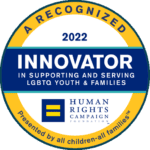Rita Taddonio, director of Spence-Chapin’s Adoption Resource Center (ARC), hopes Oprah will use her reunion journey to educate the public about the issues with which the adoption community struggles and how its members can be better supported.
So Oprah is a member of the adoption family! She has a half-sibling Patricia and they shared the news for the first time on the Oprah show on January 24th, with millions of viewers watching the emotional coming together of these two lives. It certainly makes for great live TV, and one of Oprah’s strengths as a celebrity is that she consistently uses her life experiences to educate and encourage the public on life’s challenges.
As the director of post-adoption at Spence-Chapin, my days are filled with the emotional challenges of reunion. As I watched the news unfold, I felt disappointed that there was not sufficient time to discuss the broader issues of relinquishment, search and reunion.
What a wonderful, future opportunity for Oprah to highlight the three major issues with which the adoption community struggles: 1) the lack of support for birth parents and the sense of shame those who relinquished a child for adoption back in the 50s, 60s and 70s often feel; 2) the difficulty adoptees have in finding their birth families because of some state’s sealed record regulations; and 3) the upheaval that reunion can cause to individuals and families, who want to honor their connection while trying to absorb how their lives are changed by these new relationships.
First, let’s look at the primary challenges a birth parent must face. In Oprah’s family, when asked why she did not talk to her family about Patricia, the child she relinquished her birth mother said, “I thought it was a terrible thing for me to do…giving up my daughter when she was born.” This is typical of women who relinquished a child many years ago. Today practice has changed and there is more support for women who make this decision as well as the possibility of continued contact with the adoptive family and child through what is called “open adoption.”
Making a decision to plan for adoption for a child is complex, emotional, and different for every woman. She may be courageous or she may be desperate. Many women relinquish children because they have no means of support, because they are disappointed by the man they hoped would build a family with them, because they are forced to by their parents or grandparents, or because they are shamed by their community. Whatever the reason, some women live with guilt for years because much of our society cannot comprehend “what kind of woman” would give up her child.
Like Oprah and Patricia’s mother, they may shun a relationship with their birth child, because they are afraid they will be judged harshly. Decades ago, women were often told to “forget about” the child they gave birth to, and “just get on” with their lives. They often tried, never telling their husbands or children about their first child, the one they did not raise. But that child is never far from their thoughts.
For some birth parents their desire to know that their child is okay and for some kind of connection leads them to search even thought they might fear rejection and anger from the child/young adult/adult they relinquished.
These are strong emotions that cannot be dismissed. Birth parents need and deserve the opportunity to process these feelings. We at Spence-Chapin run a support group for birth mothers that meets monthly. In this room, women of all ages and all cultures have the chance to talk about this one huge, defining decision of their lives. The healing that takes place through support is evident, and it would be wonderful if Oprah would consider focusing an episode on birth parents and what they have experienced.
Now, let’s look at the reunion journey for adult adoptees. These men and women face an uphill battle to discover basic facts—including all important health issues— about their lives, especially in New York State where adoptees are only given non-identifying information about their origins. Social service agencies, including Spence-Chapin, are not allowed by NYS regulation to divulge to an adoptee information that identifies the birth family, including the state, town and hospital in which he or she was born, and the names and address of birth parents or siblings. This is true even if a birth family member has come back to the agency seeking their child. All are advised to register with New York State’s Adoption Information Registry, and the International Soundex Reunion Registry, in the hope that a match is made.
Members of the Spence-Chapin Adult Adoptee support group struggle with the frustration and grief of being denied such basic human information. As one adult adoptee put it, “I could be dating my sister, and I would never know it.” As another said, “I feel like I am in a witness protection program; all my identity has been taken away from me and I can’t access it.” What a wonderful opportunity for Oprah to take up the reins of this debate, opening up the discussion of closed records and the rights of adoptees.
Finally, there is the complex issue of navigating family relationships after a reunion. Sadly, the media continues to simplify adoption reunion. Countless clips of Oprah hugging her new-found sister play across magazine covers and Internet websites. However there was not much discussion on the impact to both families and the individuals involved. Oprah’s very public reunion gives us all a wonderful opportunity to portray a more realistic picture, and to move the dialogue to center stage.
Reunions are not magical hallmark moments. They involve a process always beginning with delight or disappointment, depending upon a person’s expectation, and then the hard work of building a relationship —one that needs to unfold with mutual respect for boundaries and feelings. The assistance of a counselor or a support group of one’s peers can be invaluable in t this process. Navigating a relationship with an intimate stranger is something both exhilarating and exhausting, and roadmaps should be available and welcoming.
Oprah is our most famous of female celebrities, and now she is in early stages of reunion. It is a journey that could educate us all regarding the relationships within the adoption constellation and how we can better support each member.
Rita Taddonio
Director of Post-Adoption Services





